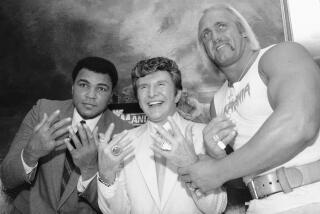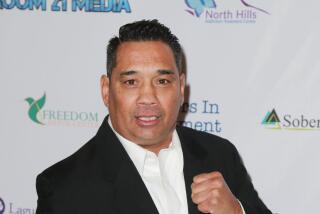Boxer Quarry Is Dead
Jerry Quarry, the Southern California heavyweight who was born too late to become a champion, has died too early, passing away Sunday at age 53 from complications following pneumonia.
Known as Irish Jerry and, because of his roots, the Bellflower Bomber, Quarry exchanged bombs with the greatest heavyweights of his era, fighting Muhammad Ali, Joe Frazier and Floyd Patterson among others.
Despite a devastating left hook, a solid chin and unshakable toughness, Quarry, because of his size and a tendency to cut easily, always seemed to come up one fight, one round, one punch short of a title.
A 6-foot, 195-pounder, Quarry would beef up to 200 to 204 pounds before entering the ring. That would have made him a bona-fide contender back in the days when Rocky Marciano and then Patterson fought at under 200 pounds. Indeed, in Quarryâs two fights with Patterson, a two-time heavyweight king back in the days when there was only one champion, Quarry first fought to a draw and then won the rematch on a controversial split decision. But that was after Sonny Liston had ended Pattersonâs days as heavyweight champion.
With the coming of Liston, followed by Ali, Frazier and George Foreman, the heavyweights routinely weighed more than 220 pounds.
If he fought today, Quarry would probably be a cruiserweight. Yet he came close to a heavyweight title in 1968 after Ali had been stripped of his crown for refusing induction into the armed services. In Aliâs absence, a heavyweight tournament was held and Quarry made it to the final, barely losing to Jimmy Ellis on a majority 15-round decision.
When Ali finally returned, it was against Quarry in 1970 in Atlanta. Think of the atmosphere surrounding the much-anticipated return of Mike Tyson on Jan. 16 when heâll fight Francois Botha and double the hype to get some idea of the worldwide excitement over Aliâs return.
For Quarry, it meant a $338,000 purse, his biggest singe payday. Like Botha, Quarry insisted he wasnât just a sacrificial lamb. He was convinced he was going to win.
And to his final days, he was convinced he would have won if not for an accidental head butt that opened up a huge gash over his left eye. With blood flowing, the fight was stopped in the third round. Quarry ultimately got a rematch, but that ended much the same way, the fight stopped in the seventh round because of cuts administered by Ali.
Quarry didnât fare much better against another heavyweight champion, Frazier, who beat Quarry with a seventh-round TKO in 1969 and won in the fifth round in 1974.
Raised in a family where fighting was as natural as eating and drinking, Quarry learned to use his fists early.
His father, who claimed to have been a fighter himself, had the letters âH-A-R-D L-U-C-Kâ tattooed on his knuckles.
Jerry once said that the world missed some of his best fights. They occurred in the lunch court in high school. One of his brothers would instigate a quarrel with a bigger kid. Then, Jerry would step in when it was too late for the selected opponent to bow out and finish him off.
Don Chargin, one of Quarryâs promoters, remembers some of the best fights taking place in the parking lot of the Olympic Auditorium.
âBut those were family fights,â Chargin said. âSomebody would start it inside and the whole family would be involved by the time it spilled out into the parking lot.â
The family included his three brothers, two of whom--Mike and Bobby--fought professionally, and four sisters.
While Quarry supplied the boxing world with many thrills, he also helped bring the sport promoter Don King.
At least partially.
In the early â70s, King was the manager of heavyweight Earnie Shavers, who signed to fight Quarry. King, as King is wont to do, was boasting about what Shavers was going to do to Quarry.
Instead, Quarry knocked Shavers out in the first round. King decided heâd had enough of managing and turned to promoting.
Quarry, who earned a total of $2.1 million in the ring, suffered through the final years of his career broke and in ill health.
There were signs as early as 1982 of his having pugilistica dementia, a deteriorating mental condition caused by absorbing too many punches. But he went on to fight three more times.
A neuropsychologist who examined Quarry five years ago said the fighter appeared 30 years older than his actual age.
Quarry attempted an ill-advised comeback in 1992, fighting for a purse of $1,050 in Colorado. He lasted six rounds and took a beating.
âHe was missing the accolades,â said James, one of his brothers. âIn making those comebacks, Jerry would walk around saying, âIâm going to be a hero again.â â
Yet even when he had finally hung his gloves up for the final time, Jerry couldnât resist throwing punches. Describing one of his fights with Frazier to a reporter one day, Quarry wanted to show the reporter his left hook. The reporter said it wasnât necessary. Quarry insisted. The reporter relented. Quarry threw what he thought was a friendly punch and broke one of the reporterâs ribs.
Quarry, who had fought more than 200 times as an amateur, finished his professional career at 53-9-4.
âIâd do it all again the same way,â he said of his career when he looked back at age 50. But soon after that, his dementia reaching an advanced stage, requiring constant care.
On Dec. 28, he was admitted to Twin Cities Community Hospital in Templeton, Calif., because of pneumonia. When he went into cardiac arrest, he was put on life support. The decision to remove him from life support was made Sunday.
âIt was a family decision to take him off life support when [the family was] told he would probably be bedridden,â said Claude Sutherland, a family friend. âTheyâre pretty distraught.â
Funeral services are scheduled for Saturday in Shasta, Calif. âHe won the last fight of his life,â said his mother, Arwanda, âby going home to God.â
The Associated Press contributed to this story.
More to Read
Go beyond the scoreboard
Get the latest on L.A.'s teams in the daily Sports Report newsletter.
You may occasionally receive promotional content from the Los Angeles Times.










